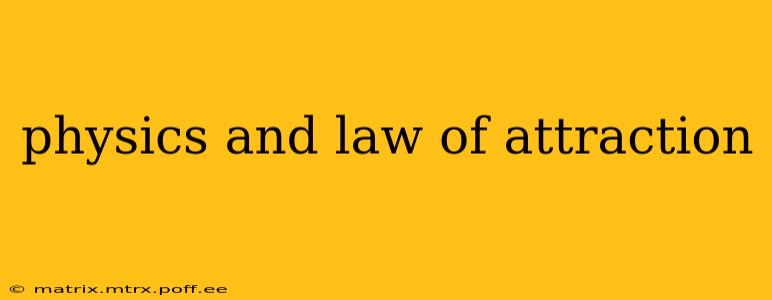The Law of Attraction, the belief that positive thoughts bring positive results into a person's life, has captivated many. But can the principles of physics shed any light on this seemingly mystical concept? While a direct causal link remains scientifically unproven, exploring the intersection of physics and the Law of Attraction offers a fascinating perspective on consciousness, energy, and the nature of reality. This exploration doesn't aim to prove or disprove the Law of Attraction, but rather to examine potential parallels and highlight the limitations of current scientific understanding.
Does Physics Support the Law of Attraction?
The short answer is: not directly. Physics, as we currently understand it, primarily deals with measurable, observable phenomena. The Law of Attraction, on the other hand, operates in the realm of consciousness and intention, areas that remain largely unexplored by mainstream science. There's no known physical mechanism by which thoughts alone can directly manipulate the material world in the way the Law of Attraction proposes.
What is the Law of Attraction?
The core tenet of the Law of Attraction is that like attracts like. Positive thoughts, feelings, and beliefs attract positive experiences, while negative ones attract negative ones. Proponents often emphasize the importance of visualization, gratitude, and affirmations in manifesting desired outcomes.
Can Quantum Physics Explain the Law of Attraction?
Some proponents of the Law of Attraction point to quantum physics as a potential explanation. They often cite the observer effect, where the act of observation influences the outcome of a quantum experiment, as evidence. However, this is a significant misinterpretation. The observer effect doesn't imply that consciousness can directly manipulate reality at a macroscopic level. It describes a fundamental limitation in our ability to measure quantum phenomena, not a mechanism for manifesting desires.
How Does the Observer Effect Work in Quantum Physics?
The observer effect in quantum mechanics refers to the influence of the measurement process on the observed system. For example, in the double-slit experiment, observing which slit a particle passes through changes the interference pattern. This doesn't mean our consciousness causes the change; it's a consequence of the interaction between the measuring apparatus and the quantum system.
Does the Concept of Energy Play a Role?
The Law of Attraction often speaks about "energy" and its vibrational frequency. While physics acknowledges energy in various forms (kinetic, potential, etc.), the idea of thoughts having specific vibrational frequencies that attract corresponding material realities lacks scientific basis. While our brains and bodies generate electromagnetic fields, these are far too weak to influence external events in the manner suggested by the Law of Attraction.
What are the Different Types of Energy in Physics?
Physics identifies several fundamental forms of energy, including:
- Kinetic Energy: The energy of motion.
- Potential Energy: Stored energy due to position or configuration.
- Thermal Energy: Energy related to temperature.
- Chemical Energy: Energy stored in chemical bonds.
- Nuclear Energy: Energy stored in atomic nuclei.
- Electromagnetic Energy: Energy carried by electromagnetic waves (light, radio waves, etc.).
None of these directly explain the mechanisms proposed by the Law of Attraction.
Can Positive Thinking Improve Outcomes?
While the Law of Attraction's claims are not scientifically substantiated, there's strong evidence that positive thinking and a proactive mindset can positively impact well-being and achievement. A positive attitude can lead to increased resilience, improved focus, and stronger social connections, all of which can contribute to success in various areas of life. However, this is a psychological effect, not a physical manipulation of reality through thought alone.
Conclusion:
The intersection of physics and the Law of Attraction remains a subject of much speculation. While the principles of physics don't currently support the Law of Attraction's claims of direct causal links between thought and material manifestation, exploring this apparent contradiction provides an intriguing lens through which to examine the limitations of our scientific understanding and the powerful influence of our beliefs and mindset on our lives. Further research into consciousness and its potential interactions with the physical world might one day bridge this apparent gap, but for now, a scientifically rigorous explanation remains elusive.
